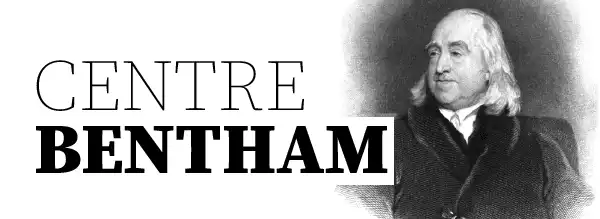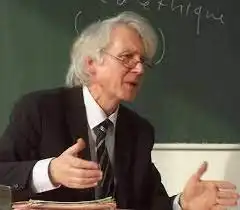Accueil>"Cosmopolitanism, State Sovereignty and International Law and Politics: A Theory" and "Can mathematics provide a universal moral language?"
13.05.2024
"Cosmopolitanism, State Sovereignty and International Law and Politics: A Theory" and "Can mathematics provide a universal moral language?"
À propos de cet événement
Le 13 mai 2024 de 09:30 à 12:30
Organisé par
Centre Bentham
The Centre Bentham is happy to invite you to its workshop on 13 May 2024 from 9:30 a.m. to 12:30 p.m. (Sciences Po Law School, Room 410T, 4th floor, 13 rue de l’Université, 75007 Paris).
Two conferences will be held:
Cosmopolitanism, State Sovereignty and International Law and Politics: A Theory
Dr Jorge E. Núñez from the University of Manchester

Biography:
Dr Jorge E. Núñez started his academic career teaching Introduction to Law in 1997 in his native Argentina (Universidad Nacional de La Plata). He moved to the United Kingdom where he was awarded his PhD in Law (Manchester). After teaching Jurisprudence in the School of Law, the University of Manchester, he joined MMU as a Lecturer in Law in 2013.
Abstract:
This book assesses the relationship between cosmopolitanism and sovereignty. Often considered to be incompatible, it is argued here that the two concepts are in many ways interrelated and to some extent rely on one another. By introducing a novel theory, the work presents a detailed philosophical analysis to illustrate how these notions might theoretically and practically work together. This theoretical inquiry is balanced with detailed empirical discussion highlighting how the concepts are related in practice and to expose the weaknesses of stricter interpretations of sovereignty which present it as exclusionary. Finally, the book looks at territorial disputes to explore how sovereignty and cosmopolitanism can successfully operate together to deal with global issues.
The work will be of interest to academics and researchers in the areas of Legal Philosophy, Legal Theory and Jurisprudence, Public International Law, International Relations and Political Science.
Can mathematics provide a universal moral language?
Jean-Pierre Cléro, Emeritus professor of the University of Rouen, member of the Centre Bentham

In Benthamian utilitarianism, doesn't calculation ensure the universality that languages seem to compromise because of their relativism?
Even if it theorises language, Benthamian utilitarianism, because it is expressed in the vernacular - English, French, Spanish, etc. - is relatively dependent on these languages in its conceptualisation. What one language calls happiness, pleasure, enjoyment... is not what another calls happiness, pleasure, enjoyment. These differences have an impact on the way we think about law, economics and society. Bentham considered them on several occasions, but particularly in the Springs of action and in the Tables that accompany them. The idea of deepening these effects and their systematisation, as well as their relationship to the various sectors of human activity, was sketched out, if not fully developed, in the Nomography.
But a difficulty arises when we take into account that Bentham insisted as much on the "calculation" aspect of his doctrine as on its "pleasure" aspect. If we are willing to acknowledge that affects are radically dependent on languages, should we say that they depend in the same way on calculations, and that there are English, French, Spanish, Russian, German ways of calculating? It would seem that, on this 'calculating' side, we have the means to question the relativism we encounter in the writing of laws, in ethics and in politics, which tend to try to accommodate it. However, Bentham never confined himself to an antinomy, and if, on the one hand, he wrote the Springs of action and nomography and, on the other, the Pannomial Fragments (which perhaps went as far as possible in the mathematisation of utility), he also wrote an Eighth Appendix to his Chrestomathia which, although it does not provide a "solution" to our antinomy, is nonetheless a way of reducing it by frankly presenting it in all its complexity.
There is no mathematics without symbolism, which does not depend on the diversity of languages; nor is there without a vernacular language to express this symbolism, which would not be understood without it. There is therefore a helical movement, with which Bentham is familiar, between vernacular languages and symbolisms (algebraic, arithmetical, geometrical, topological, vectorial, probabilistic, etc.), not forgetting this representation that Bentham wanted us to cultivate, without writing and by simple mental effort, in order to develop intuition, the act of remembering and the act of projecting, which are essential to mathematical demonstrations. It is very possible that the schematisms between pleasures and calculations go this way. We will try to take a few steps in this direction.
Perhaps the secret of these schematisations lies in a universal mathematics not unlike that of Leibniz? Even if Benthamian mathematisation, despite its author's good information on the various sectors of this discipline, remains a pious hope and too little developed.
Contact: events.edd@sciencespo.fr
À propos de cet événement
Le 13 mai 2024 de 09:30 à 12:30
Organisé par
Centre Bentham